Listening to your reading
And running while you read. Or reading while you run.
Good morning! And welcome to the triumphant (?) return of Writing About Reading. The staff of this newsletter had never intended to put out zero issues in 2022, but ye olde “day job” got the best of us. Now “we” are back for a new year and a slew of new issues—at least that’s the plan.
Whether you’re a loyal return reader or seeing this newsletter for the first time, please hit the ❤️ and forward to a friend if you like what you see. And if you’re not yet subscribed, do it.
I started 2023 by re-reading Wolf Hall and Bring Up the Bodies to get my brain back in Thomas Cromwell mode for Hilary Mantel’s third installment, The Mirror and the Light. It was terrific, but probably my least favorite of the trilogy. Trilogies usually go that way, no? Since finishing that, I’ve also read A Cure for Suicide by Jesse Ball, Us Against You by Fredrik Backman, and Killings by Calvin Trillin.
But today’s issue is about the books I read last year—about how I read them.
I read 42 books in 2022, and upon review, I see that with exactly half of them I listened to some portion on audiobook. That feels insane since, prior to the pandemic, I had never listened to an audiobook in my life.
I touched on audiobooks briefly in my January 2021 letter, but since then, I guess I’ve gone a little audio-crazy.
Here’s my process: I start out with a print copy of the book I want to read, and then, unless it’s brand new fiction (like The Trees by Percival Everett) or somewhat obscure fiction from the eighties (like Small World by David Lodge), I can almost always find the audiobook on either Libby or Hoopla (free library apps) or Libro ($15 per month, which includes one free audiboook credit; the rest are highly discounted). And then (stay with me here), if I also borrow the e-book from Libby or Hoopla, I’ve got the book in all three formats and can be making progress at every possible free moment: in bed at night (print book); on the train or subway or any time I am able to read but don’t have the print book with me (e-book on my phone); and while performing any task at home where my hands aren’t free: washing dishes, folding laundry, even showering (audiobook).
Another benefit of having the e-book version at any given time is that it’s searchable. So let’s say I suddenly hear a character name I don’t remember (this happened with the Cromwell trilogy—so many dukes), I’ll pop open the e-book and search for the name and instantly find the first mention of that character.

There’s another venue in which audiobooks have been a game-changer for me: running. I got back into running last spring, and have been running twice per week or so ever since (4-8 miles per run, always outdoors). When I first started running again, I wouldn’t listen to anything at all, I’d run in silence and just hear my own breathing. Then I started playing audiobooks from my phone on speaker while holding the phone in my hand—annoying for other people on the trail, but at least I run relatively fast, so they’re not hearing my book for very long once I pass them. Still, not ideal. Finally, I found the perfect running headphones and now I always listen to an audiobook while running. It not only makes the run more interesting, but it also tends to make me think less about the run and the distance—I’ll suddenly find I’m so wrapped up in the book that I’ve gone more miles than I planned. (Strava briefly interrupts the book after each mile to tell me my pace.) You lose yourself in the narration.
But the best remainder of an audiobook is the permanent memory of where you listened to the book.
My wife and I will always remember that we listened to Olympus, Texas by Stacey Swann while driving through Yosemite National Park (read by Karissa Vacker, who gives each of the uniquely-flawed characters their own distinctive twang). We listened to a large chunk of The Dutch House by Ann Patchett on a very long walk across the dunes on Cape Cod in winter during the pandemic (read by Tom Hanks, which was obviously a pleasure, and is what led us to choose a book I think we would have otherwise skipped based on the plot description—that was my first Patchett and it led me to read Commonwealth too). I listened to most of Wolf in White Van by John Darnielle doing yard work (it’s a short book) after I read his newest novel Devil House in print, then discovered all his books are read by the author, who has a perfectly matter-of-fact tone for his haunting plots. (Darnielle is the lead singer of The Mountain Goats.)
And this applies to runs, too: after reading most of Horse by Geraldine Brooks in print (one of my very favorite reads of 2022), I listened to the heartbreaking final section on one long 10-mile run, on which I was motivated to keep running because I didn’t want to stop listening. (Horse is performed by a whole cast of pitch-perfect actors.) All three of Mantel’s Cromwell books are read by Ben Miles, the same British actor who played Cromwell on the stage for the Royal Shakespeare Company's adaptations of the novels; his voice is the one in my head now for Cromwell, and I’m good with that.
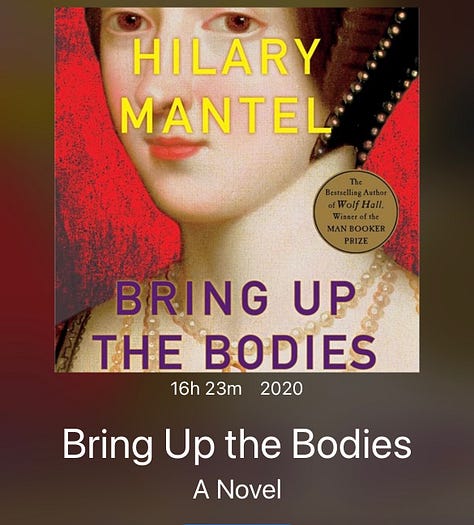

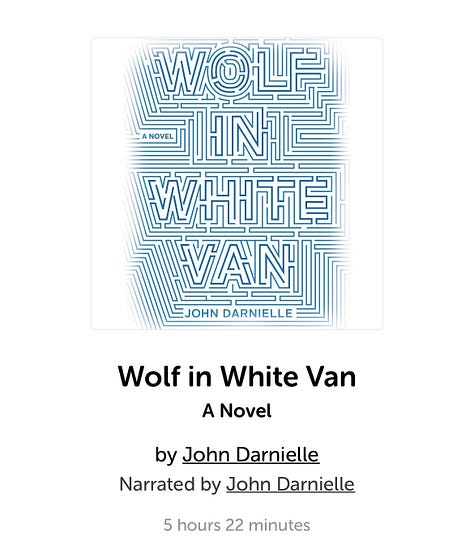
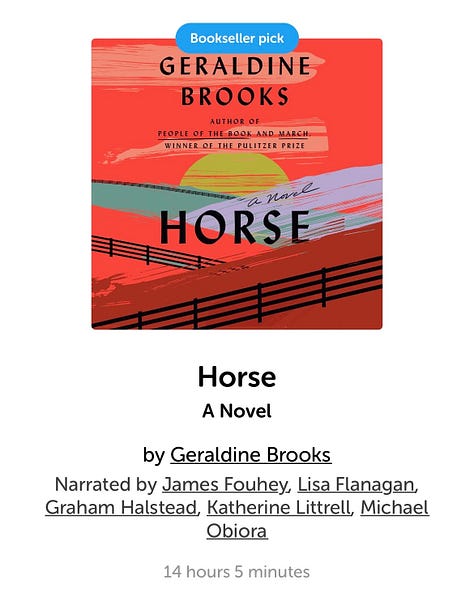


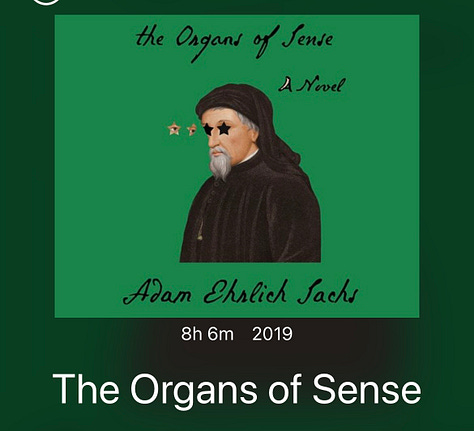

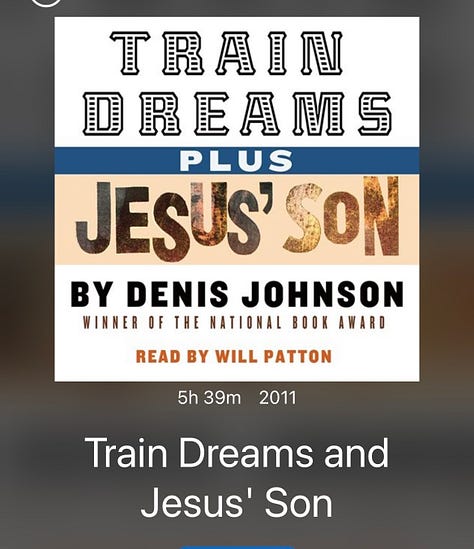
Some books are obviously enhanced by the performer. The Mission Song by John le Carré is read by David Oyelowo, famous from playing MLK in “Selma”; Song of Solomon is read by Toni Morrison herself, whose voice is legendary. I think I enjoyed The Organs of Sense by Adam Ehrlich Sachs, which has a lot of exhausting repetition for comedic effect, much more than I would have in print thanks to the performer, who did a very funny voice for the quirky astronomer, the book’s primary narrator.
But sometimes the performer ruins it for me. I couldn’t bear the readers of The Feral Detective by Jonathan Lethem or Trust Exercise by Susan Choi; gave up and finished both books in print.
A few other audiobooks I’ve loved: The Lincoln Highway by Amor Towles (read by Edoardo Ballerini, Marin Ireland, and Dion Graham; the voice for Duchess, the novel’s con man and main fascination, is perfect); Less by Andrew Sean Greer (Robert Petkoff makes the hapless narrator very charmingly sympathetic), and Edward Snowden’s memoir Permanent Record (not read by Snowden, disappointingly, but the actor Holter Graham acts as stand-in).
So, who cares about any of this? What’s the point of over-sharing the granular specifics of my audiobook routine?
I suppose because literary people appear to feel some type of way about audiobooks. There’s a vague stigma around them. They’re sometimes cast as cheating in some way, or lazy, or for less serious readers. Are you really getting the same experience as you would from reading the text? Are you seeing the language, the clever turns of phrase, the actual writing, as closely as you would in print? Are the performative choices of the audiobook reader coloring the book for you in subtle ways you don’t realize?
Those questions are perfectly reasonable, but they all pale in light of one fact that seems to me far more important: people consuming books, in whatever way they choose to consume them, is a good thing.
There are too many people now who don’t read books at all. If listening to them is more doable in light of all the other distractions we have in our lives, great—you’re still reading, and that’s what matters.
So if you find that you haven’t had enough time lately to get through a print book, try listening to one.
Thanks for reading with me! If you enjoyed, please forward to your friends.
Coming up next issue: metonymy and repetition in Hilary Mantel’s Cromwell trilogy. And after that: a funeral for two great lit mags.



I just listened to my first audio book ever last month. It was a book that I had loved in the print version 5+ years ago: Wild Sheep Chase by Murakami. It was tripppppppy listening to it - kinda remembering the plot line but also not. I like the idea of listening and having the physical copy... I will take your advice there. I'm usually a print only copy kinda girl. Anyway - love this substack! pumped to find you here :)
I have those headphones. The best